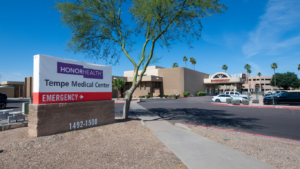After chemotherapy damaged her heart, Mary Olivia Bingham received a successful heart transplant at The University of Arizona Medical Center-University Campus.
A 3-year-old Vail, Ariz., girl is back at home, jumping on the bed and teasing her four siblings after receiving a heart transplant at The University of Arizona Medical Center-University Campus last month.
Cardiothoracic surgeons in the UA department of surgery performed the April 12 heart transplant on Mary Olivia Bingham after chemotherapy damaged her heart.
“This is a miracle,’’ said the child’s mother, Taber Bingham, as she held a sleeping Mary in her arms a few days following the heart transplant.
This beautiful child with wide, brown eyes and a dynamic spirit has endured great challenges. She came to live with Taber and her husband, Burke Bingham, and their four children when she was 3 weeks old. The Binghams took foster children into their home on an emergency, short-term basis.
When Burke first saw Mary, he somehow knew this child would become his daughter. While Mary had a family that adored her, they could not care for her. The Binghams were set to adopt her in fall 2010, when Mary was 18 months old.
The day before the adoption was to be finalized, however, the family received devastating news. Mary, who had been in pain, was diagnosed with acute monocytic leukemia, rare in children. Tests showed the cells had invaded as much as 90 percent of her bone marrow.
The best chance of survival came in the form of more than five months of intense, in-patient chemotherapy. To finalize the adoption, the judge traveled to the hospital room at UAMC, with Mary surrounded by the Binghams and her four new siblings, Beck, 10, twins Jake and Raven, 13, and Sierra, 15.
The Binghams knew the very toxic chemotherapy could damage Mary’s heart. “I thought, ‘We’ll deal with it when it comes,’” said Taber, a labor and delivery nurse.
She and her husband, an employee with the City of Tucson, staggered their schedules so one of them could always be with Mary. The child’s biological grandmother would sing songs to her over the phone.
About a month after discharge, with Mary in remission, it was discovered that the chemotherapy had indeed damaged the child’s left ventricle, and her heart was pumping half the normal amount.
It was hoped that medication might help the heart recuperate, but Mary’s condition worsened. On Thanksgiving Day 2011, she had a seizure and was airlifted to UAMC. Her parents thought they were losing her.
Always the fighter, Mary rebounded. It was clear, however, that her heart was not improving. In early April, she was placed on the heart transplant waiting list.
On April 11, the family ended up at UAMC after Mary became ill. While in the hospital, word came that a heart might be available.
While the size and genetics of the donor heart were excellent matches, it wasn’t clear whether the heart itself would be in good enough condition – the donor had required CPR, which can damage the heart. Also, the donor was several hours away by air, and a delay of more than four hours also can damage the organ.
That night, Dr. M. Cristina Smith, assistant professor in the UA department of surgery and director of heart transplant and ventricular-assist device services at UAMC, flew to the donor, who was on life support with no brain activity. There, she determined the heart was “perfect.”
As Smith rushed back to Tucson with the heart, Mary was prepared for surgery. When the wheels of the aircraft hit the ground, Mary was placed on the heart-lung bypass machine, and her heart was removed.
The donor heart was transplanted in the early morning hours of the next day by Smith and Dr. Jess L. Thompson III, pediatric cardiovascular surgeon and assistant professor in the UA department of surgery.
“The surgery went extremely well,’’ said Thompson, adding that about 300 pediatric heart transplants are performed each year in the U.S. “The heart function was excellent.’’
Dr. Michael F. Teodori, professor of surgery and director of pediatric heart surgery, added, “Drs. Smith and Thompson did a terrific job with the entire team continuing the pioneering work of the heart transplant center here at The University of Arizona Medical Center.”
The Binghams are joyful over the heart transplant, but know a family is grieving the loss of their baby. They are thankful for the gift that saved their child’s life, and for the UAMC team.
“It is a fantastic team,’’ Burke said.
Said Taber, “They have all collaborated for Mary. They are almost like family.’’
The couple said they were relieved they did not have to leave Tucson.
“We didn’t have to go anywhere else,’’ Taber said. “We didn’t have to uproot our family and leave behind all of our resources in the community. We’re very fortunate.’’




